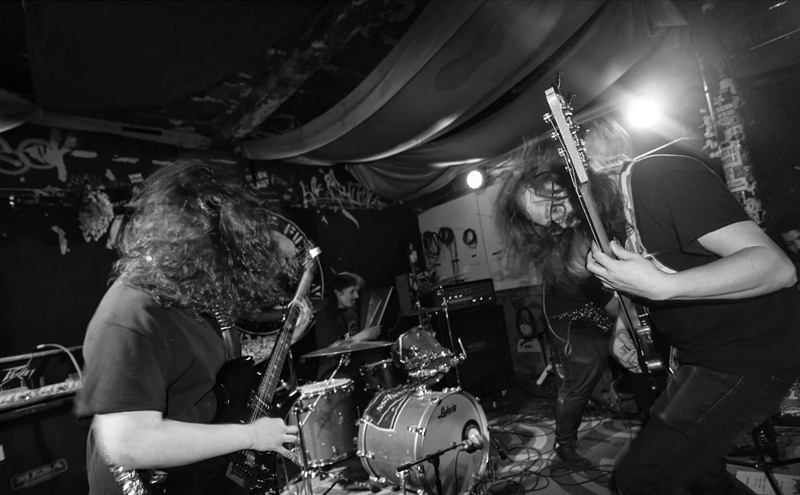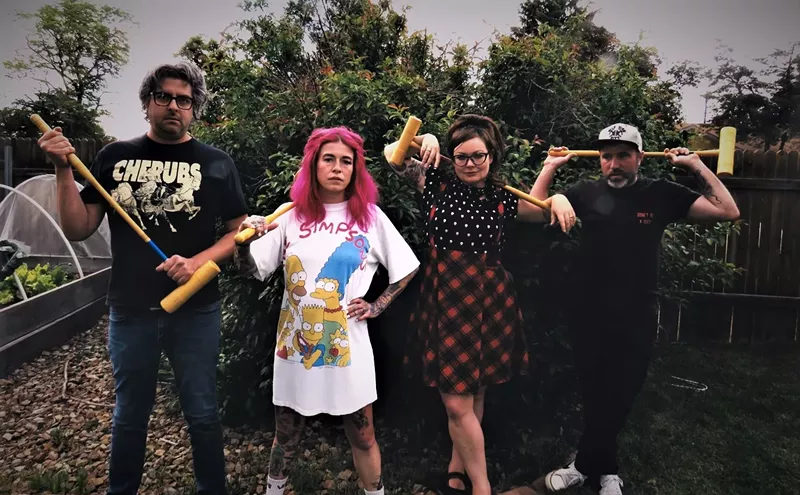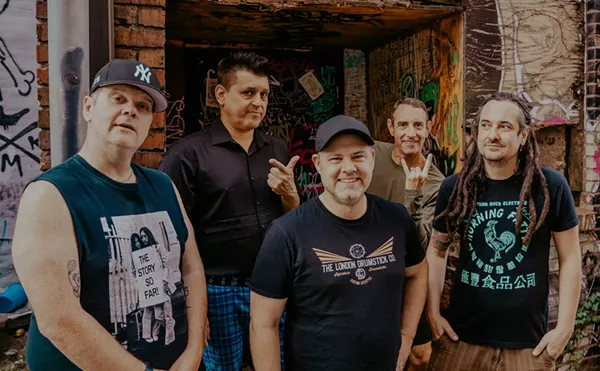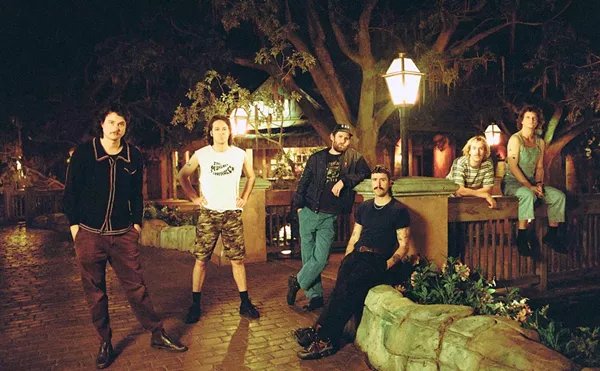We were the band that our first show was sold out," notes Patrick Riley about the live debut of his group, Tennis. "From the start, it was like being thrown into the fire."
Riley clearly has a firm grasp of how fortunate his band has been after getting early encouragement from friends in the bands Woodsman and Family Portrait, whose labels, Fire Talk and Underwater Peoples, respectively, put out Tennis's first two seven-inch releases in July 2010. Those two records and a flurry of write-ups on music blogs were key to the group's securing a record deal with Fat Possum Records — in the time it takes most bands to find their footing.
"Our band started from press, flat out," Riley acknowledges. "We didn't play a show, and we had a bunch of press about our band. It's a truth, but it's an unfortunate truth in a way that you can record something without going through all the things that bands used to do in the past kind of quietly and without notice. I feel like so many bands got to play their first shows in front of five people, and nobody cared and they screwed up a bunch, but that's okay because it's their first show and it's in front of five people."
Not so with Tennis. Almost immediately, the spotlight was pointed at Riley and his wife, Alaina Moore. Shortly after playing their first shows, the pair ended up recruiting James Barone, an older school mate of Riley's from Evergreen High, whose band had played shows with Riley's band at the time. Riley and Barone didn't know each other well in high school, but they were both in the audio-engineering program at the University of Colorado Denver. While Riley felt that it didn't quite measure up to his expectations and ended up dropping out, Barone completed the program, and he proved to be an ideal addition to the band. "We'll discuss what kind of drumbeat we want," Riley marvels, "and he always takes it to the next level that we never expected to go to. He surprises us day in and day out."
In the last year and a half, Tennis has played more than 200 dates, including the Primavera edition of the All Tomorrow's Parties festival, and has been written up in several prominent publications, among them the New York Times. In that time, the act has recorded two full-length albums, 2011's Cape Dory and this week's Young & Old, both on the Fat Possum imprint. For Young & Old, the followup to the self-produced Cape Dory, the trio felt like it had to take the leap of seeking an outside producer.
"We were pretty scared about working with a producer at all," Riley confesses. "We're very much anti-producer people. At least James and I grew up really listening to a lot of music and noticing how bands would change when a producer was introduced into the mix — and usually not in the best of ways, in our minds. I think it came down to us coming up with a list of all the bands that were self-produced for the brunt of their careers. The first one that came to mind was the Black Keys."
With that in mind, Tennis reached out to Keys drummer Patrick Carney, who showed an immediate interest in the group and ended up signing on to produce Young & Old. While it would have been easy for the group to rely on the formula that worked for Cape Dory, even a quick sampling of the new album reveals that the members of Tennis really challenged themselves to take the music in a different direction without compromising a cohesive sound.
"I think that the biggest difference is that we wrote the album to try to connect on a greater level," says Riley. "I think we were figuring out what we liked and what we didn't like about our band just from playing all those shows. We really homed in on the qualities of our music that we wanted to portray on the new album and diminished the qualities we didn't want to hear anymore."
Indeed, the lyrics this time out didn't come from Riley and Moore's personal experiences, as they had on Cape Dory. Instead, paradoxically, Moore's words aim for universal expressions of subjective truths. This can especially be heard on the song "Take Me to Heaven," which fits into an arc of ideas inspired by Moore's reading of one of the twentieth century's most iconic poets.
"Alaina had stumbled upon William Butler Yeats's poem 'A Woman Young and Old,'" Riley reveals. "It kind of documents a woman's sexuality and her defining aspects of her existence throughout her childhood and into her old age. It's a really dense poem, and there's a lot of social commentary to it. She wanted to use that as kind of the foundation for this album, lyrically. 'Take Me to Heaven' is kind of like an older perspective, looking on and accepting death and ways of looking at it, whether there is a God or isn't, or an afterlife — just the defining qualities of a woman as she hits old age and as she's viewing death."
Musically, Young & Old also carries more heft than its predecessor without losing the breezy insouciance that made the early Tennis songs so immediately captivating. And yet any time pop music dares to go deeper than surface accessibility, it risks misinterpretation — something that Riley and company seem to brush off with good spirits.
"It'll be a nice thing to see what the common consensus is on what people think the album is about and what meanings they assign to it," says Riley. "'My Better Self' was kind of our homage to the idea of how you can't do anything without the meaning being assigned by another person or taken the wrong way. And the meaning comes and goes, which is something we've had to come to terms with. But I think we're enjoying it now. It's kind of more interesting to us when people can take our songs and add more meaning to them or take away meanings, or take them in a direction we never thought it would go. That makes it fun for us."
As with any artist or group that reaches a certain level of fame or notoriety, Tennis has had more than its fair share of good, bad and misguided press. Whether show reviews focused on Alaina's appearance, a misidentification of Riley as having once been in the Ataris — along with a review centered on that "fact" — or any number of other humorous or unfortunate bits of information, Tennis has learned to take a philosophical approach to its publicity. "Dealing with all the misinformation has become kind of comical at this point," Riley says, adding, "It's impossible for someone to get the whole picture without knowing us personally or without being there in the recording studio and seeing what's going on.
"In all honesty, if they did, it wouldn't be as good of a picture or as special, because the element of mystery isn't there."












